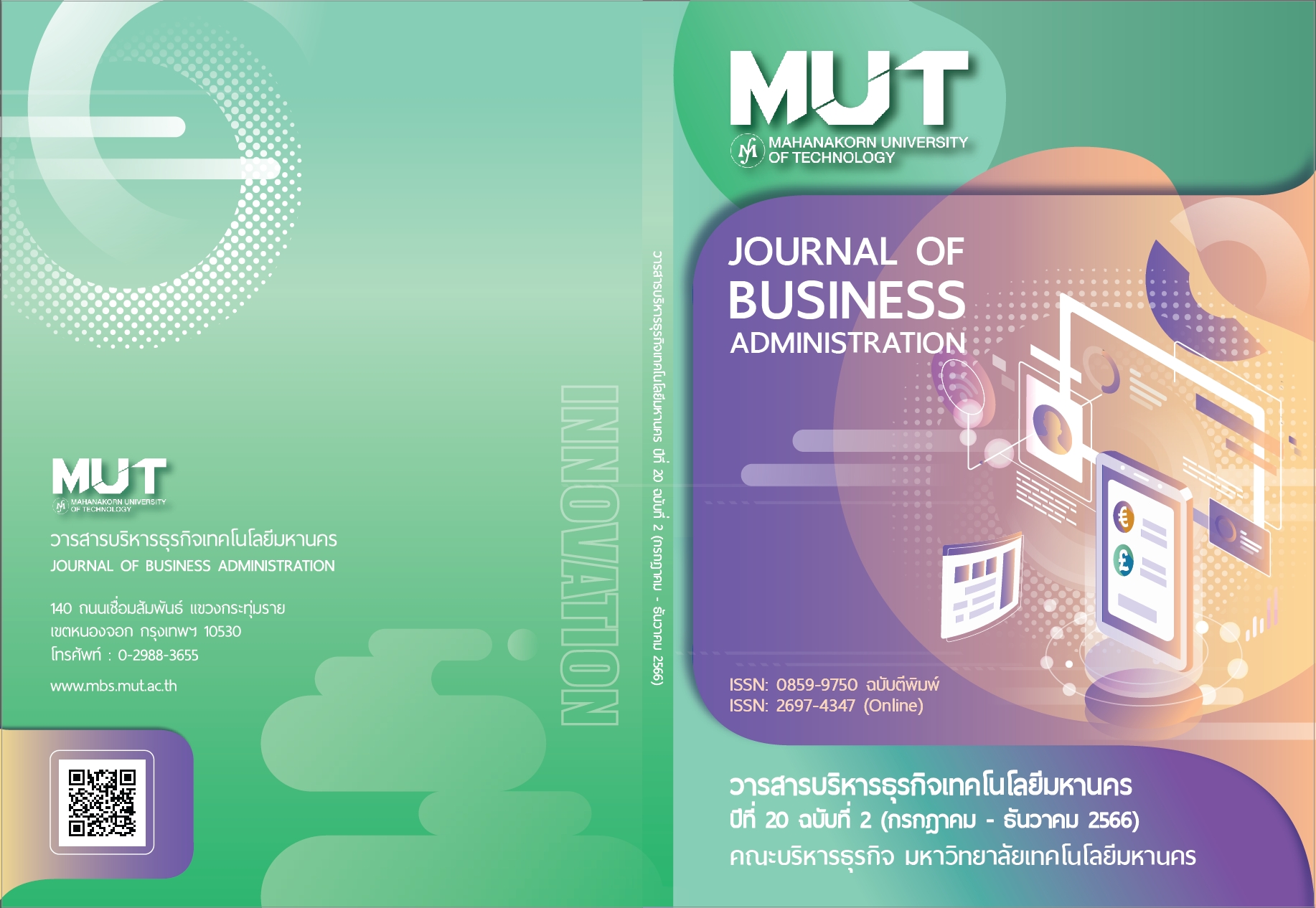การเปิดเผยข้อมูลความยั่งยืนกับการวางแผนภาษี: กรณีบริษัทในดัชนีหุ้นยั่งยืนประเทศไทย
คำสำคัญ:
ความรับผิดชอบต่อสิ่งแวดล้อม, สังคม, การกำกับดูแลกิจการ, การเปิดเผยข้อมูลความยั่งยืน, การวางแผนภาษี, ดัชนีหุ้นยั่งยืนบทคัดย่อ
การศึกษาในครั้งนี้มีวัตถุประสงค์หลักเพื่อสำรวจระดับการเปิดเผยข้อมูลความยั่งยืน และทดสอบความสัมพันธ์ระหว่างระดับการเปิดเผยข้อมูลความยั่งยืนกับการวางแผนภาษีของบริษัทจดทะเบียนในตลาดหลักทรัพย์แห่งประเทศไทยที่อยู่ในดัชนีหุ้นยั่งยืน (SETTHSI or SETESG index) โดยใช้ 116 ตัวอย่างบริษัทจากกลุ่มดัชนีหุ้นยั่งยืนในระหว่างปี 2563 - 2564 โดยใช้แบบประเมินการเปิดเผยข้อมูลความยั่งยืนที่ปรับปรุงมาจากคู่มือการรายงานความยั่งยืนของตลาดหลักทรัพย์แห่งประเทศไทยและหลักเกณฑ์การรายงานความยั่งยืนของ Global Report Initiative สำหรับการวางแผนภาษีวัดจากอัตราภาษีเงินได้ที่แท้จริงงวดปัจจุบัน อัตราส่วนภาษีเงินได้ต่อสินทรัพย์รวม และอัตราส่วนภาษีเงินได้ต่อกระแสเงินสดจากกิจกรรมดำเนินงาน
ผลการศึกษาพบว่า บริษัทจดทะเบียนส่วนใหญ่ในกลุ่มดัชนีหุ้นยั่งยืนมีการเปิดเผยข้อมูลความยั่งยืนอยู่ในระดับสูงและมีแนวโน้มที่จะเปิดเผยข้อมูลความยั่งยืนเพิ่มขึ้น โดยกลุ่มอุตสาหกรรมทรัพยากร เปิดเผยข้อมูลสูงสุดที่ระดับ 0.693 และกลุ่มอุตสาหกรรมเทคโนโลยีเปิดเผยข้อมูลความยั่งยืนต่ำสุด ที่ระดับ 0.556 และพบว่ามิติด้านการกำกับดูแลมีการเปิดเผยข้อมูลสูงสุดและมิติด้านสิ่งแวดล้อมมีการเปิดเผยข้อมูลต่ำสุด ที่ระดับ 0.660 และ 0.596 ตามลำดับ ผลการศึกษานี้ ถือเป็นหลักฐานเชิงประจักษ์ที่แสดงให้เห็นว่า การเปิดเผยข้อมูลความยั่งยืนโดยรวมหรือแยกตามมิติด้านสิ่งแวดล้อม สังคม และการกำกับดูแลมีความสัมพันธ์เชิงลบต่อการวางแผนภาษี โดยชี้ให้เห็นว่า บริษัทจดทะเบียนในกลุ่มดัชนีหุ้นยั่งยืนที่เปิดเผยข้อมูลความรับผิดชอบต่อสิ่งแวดล้อม สังคม และการกำกับดูแลกิจการในระดับสูงโดยภาพรวมหรือแยกตามมิติสูง และมีแนวโน้มการวางแผนภาษีต่ำ แสดงถึงความตระหนักในหน้าที่ความรับผิดชอบการเสียภาษี
เอกสารอ้างอิง
Chen, X. 2018. Corporate Social Responsibility Disclosure, Political Connection and Tax Aggressiveness: Evidence from China’s Capital Markets. Open Journal of Business and Management. Vol. 6. 151 - 164.
Chongruksut, W. 2016. Corporate Social Responsibility Disclosure in Thailand. Srinakharinwirot Research and Development: Journal of Humanities and Social Sciences. Vol. 8. No. 15. 128 - 144.
Davis, A. K., Guenther, D. A., Krull, L. K. and Williams, B. M. 2016. Do Socially Responsible Firms pay more taxes?. The Accounting Review. Vol. 91. No. 1. 47 - 68.
Fama, E. F. and Jensen, M. C. 1983. Separation of Ownership and Control. Journal of Law and Economics. Vol. 26. 301 - 308.
Lanis, R. and Richardson, G. 2012. Corporate Social Responsibility and Tax Aggressiveness: An Empirical Analysis. Journal of Account & Public Policy. Vol. 31. No. 1. 86 - 108.
Mahadeo, J. D., Oogarah-Hanuman, V. and Soobaroyen, T. 2011. A Longitudinal Study of Corporate Social Disclosures in a Developing Economy. Journal of Business Ethics. Vol. 104. No. 4. 545 - 558.
Melo, L. Q., Moraes, G. S. C., Souza, R. M. and Nascimento, E. M. 2020. Does Corporate Social Responsibility Affect the Tax Aggressiveness of Firms? Evidences of the Brazilian Stock Market. Revista Catarinense da Ciência Contábil. Vol. 19. 1 - 19.
Mohanadas, N. D., Abdullah Salim, A.S. and Pheng, L.K. 2019. CSR and Tax Aggressiveness of Malaysian Listed Companies: Evidence from an emerging economy. Social Responsibility Journal. Vol. 16. No. 5. 597 - 612.
Nadiah, H., Wan, K., Mastora, Y., Rohayu, Y. and Rozainun, A. 2017. Corporate Social Responsibility (CSR) Disclosure and Its Impacts towards Corporate Tax Aggressiveness. Journal of Applied Environmental and Biological Sciences. Vol. 7. No. 5. 10 - 15.
Na Phuttalung, W. 2021. The Relationship between Corporate Social Responsibility and Tax Planning of Listed Companies in Resources Industry Group on The Stock Exchange of Thailand. Master of Accountancy Independent Study. Kasetsart university.
Preuss, A. and Preuss, B. 2017. Corporate Tax Payments and Corporate Social Responsibility: Complements or Substitutes? Empirical Evidence from Europe. Business and Economics Journal. Vol. 8. No. 4. 1 - 8.
Sari, D. and Tjen, C. 2016. Corporate Social Responsibility Disclosure, Environmental Performance and Tax aggressiveness. Business International Research Journal of business studies. Vol. 9. No. 2. 93 - 104.
Stock Exchange of Thailand a. 2022. Sustainability Reporting Guide. Retrieved September 5, 2022 from https://www.setsustainability.com/download/nqcywd36j9tmk5x
Stock Exchange of Thailand b. 2022. SETTHSI Index Series. Retrieved September 23, 2022 from https://www.set.or.th/market/ information/securities-list/constituents-list-SETTHSI
Thaipat Institute. 2017. Are CSR and ESG different? Retrieved August 21, 2022 from https://www.thaicsr.com/2017/06/csr-esg.html
Thanjunpong, S. 2014. The Impact of Corporate Governance on Tax Planning: Stock Exchange of Thailand. Journal of Accounting Profession. Vol. 10. No. 28. 5 - 18.
Thanjunpong, S. and Bangmak, R. 2017. The Influence of Board of Directors, Audit Committee
and Ownership Structure on Tax Planning: An Empirical Evidence of Thailand. Journal of Accounting Profession. Vol 13. No. 37. 29 - 44.
Thanjunpong, S., Chaiwong, D. and Dechsiri, P. 2018. The Association between Sustainable Development Report Disclosures and Tax Planning of Listed Companies in the Stock Exchange of Thailand. MFU Connexion: Journal of Humanities and Social Sciences. Vol. 7. No. 2. 273 - 295.
Wallace, R. S. O. 1988. International and International Consensus on the Importance of Disclosure Item in Financial Reports: A Nigerian Case Study. The British Accounting Review. Vol. 20. No. 3. 223 – 265.
ดาวน์โหลด
เผยแพร่แล้ว
ฉบับ
ประเภทบทความ
สัญญาอนุญาต

อนุญาตภายใต้เงื่อนไข Creative Commons Attribution-NonCommercial-NoDerivatives 4.0 International License.
ข้อความ ข้อคิดเห็น ข้อมูล เนื้อหา รูปภาพ แผนภูมิ แผนผัง เป็นต้น ที่ปรากฏและแสดงในบทความต่างๆ ในวารสารบริหารธุรกิจเทคโนโลยีมหานคร ถือเป็นความรับผิดชอบโดยตรงของผู้เขียนบทความนั้นๆ มิใช่เป็นความรับผิดชอบใดๆ ของวารสารบริหารธุรกิจเทคโนโลยีมหานคร และมหาวิทยาลัยเทคโนโลยีมหานคร
บทความที่ตีพิมพ์ในวารสารบริหารธุรกิจเทคโนโลยีมหานคร ถือเป็นลิขสิทธิ์เฉพาะของคณะบริหารธุรกิจ มหาวิทยาลัยเทคโนโลยีมหานคร หากบุคคลหรือหน่วยงานใดต้องการนำทั้งหมดหรือส่วนใดส่วนหนึ่งไปเผยแพร่ต่อหรือเพื่อกระทำการใดๆ จะต้องได้รับการอนุญาตเป็นลายลักษณ์อักษรจากคณะบริหารธุรกิจ มหาวิทยาลัยเทคโนโลยีมหานครก่อนเท่านั้น


